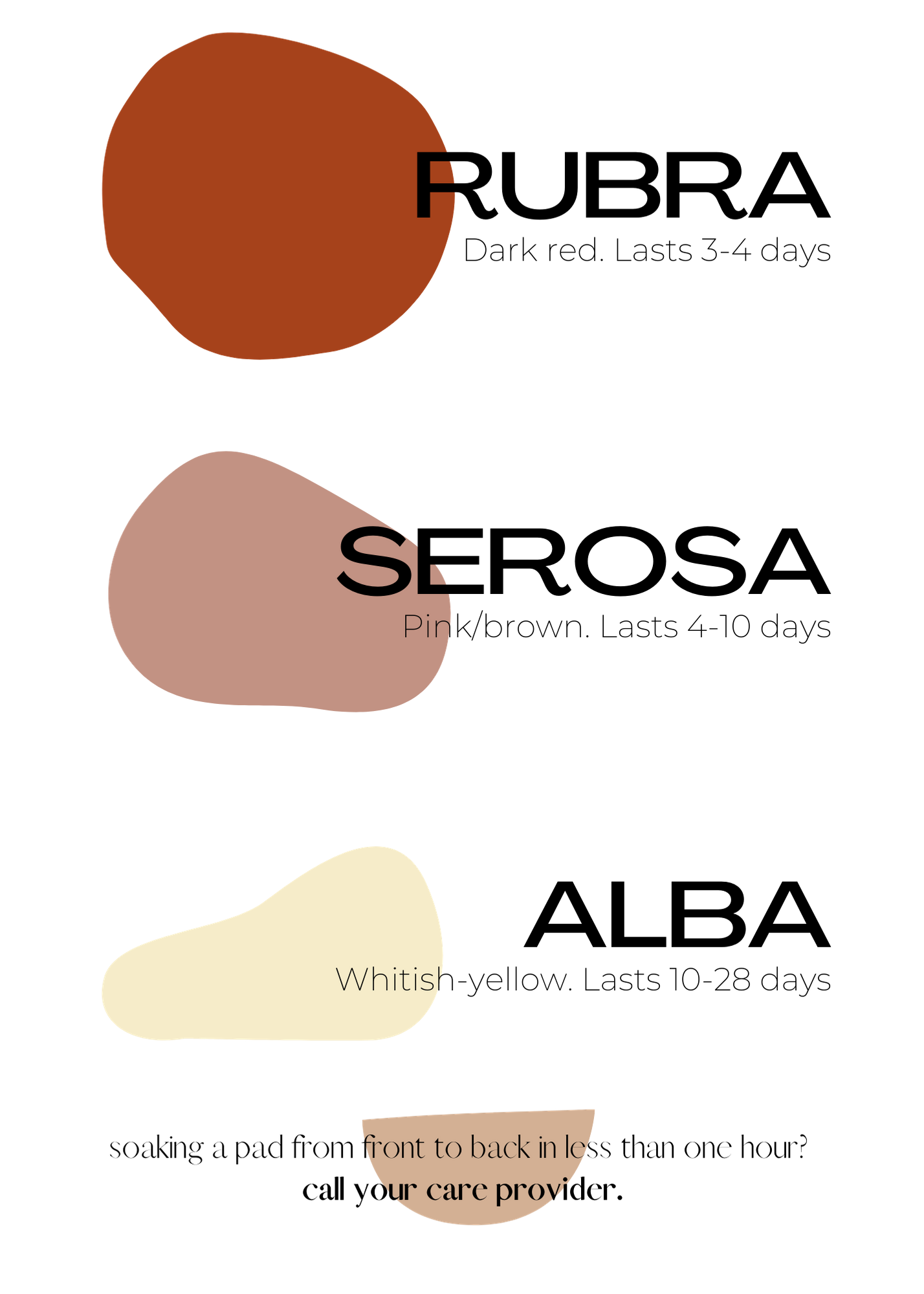“I Didn’t Realize I’d Be Leaving in Diapers Too”
“I didn’t realize I’d be leaving in diapers too” is one of those new mom mantras. Introducing postpartum bleeding, or in the medical community known as Lochia, and it happens after both vaginal and cesarean births. Lochia is a result of the uterus shedding its skin now that it is no longer needed after you birth a baby. Typically, you can expect 4-6 weeks of bleeding postpartum, but that range varies from person to person. You also might notice your bleeding going away, then when you feel like a superhero and decide to go out to lunch and do a grocery shop all in the same day, the bleeding comes back. That being said, I like to think of postpartum bleeding as a reminder for us to slow down and nurture our bodies & babies during the postpartum period. Racing to “bounce back” is bull - and your body will remind you of that when you overdo it and your lochia comes back with a vengeance. You also might find you bleed more if you’ve already had a baby versus your first time.
What is normal when it comes to postpartum bleeding?
There are a few stages of lochia:
The first stage is called Lochia Rubra which can last up to four days postpartum and consists of the immediate discharge of blood, mucus, and tissue.
Then comes the second stage, called Lochia Serosa, a pinkish-brown, watery discharge that lasts up to 10 days afterward.
The final stage of the process is called Lochia Alba, a yellowish white vaginal discharge that can last as long as four to six weeks after birth.
Warning Signs:
If at any time you find yourself soaking through a pad from front to back in less than one hour, it may be a sign of postpartum hemorrhage.
Call your care provider or go to the hospital if this occurs.
Clots larger than the size of an orange
A foul smell
Heavy fresh bleeding (red colour) reappearing after the lochia rubra stage has ended.
How do I manage this?
Avoid tampons. They can cause infections while your body is still healing.
Most will start with grown up diapers plus overnight pads will be needed for the first few days or up to one week of bleeding, then transition to regular pads, and eventually panty liners as the bleeding tapers off.
Take it easy! You might find yourself bleeding more as you become more active.
Period Panties for Postpartum Bleeding
Period panties have been taking over social media recently. It is such a genius invention, I was thrilled to see a specific postpartum pantie line Proof. While it can be used to absorb fluids from periods, sweaty workouts, or pregnancy bladder leaks, Proof undies are a total upgrade from the disposable underwear you would typically come home from the hospital in. Graduating from adult diapers to regular underwear is a big sigh of relief for a lot of birthing people who just want to feel a little bit more human again, and Proof undies can get that going in the early stages when your postpartum bleeding is at its heaviest (the super heavy styles hold 5 tampons or 10 teaspoons of liquid and can replace panty liners and pads as well as replacing or backing up tampons and cups).
Period panties also speak to me from a sustainability level. 12 billion pads and 7 million tampons are dumped into US landfills every year. Even organic or biodegradable pads + disposable underwear have components that can take up to 500 years to dispose. Your Proof undies can be washed hundreds of times, extending their life beyond your postpartum period and into your menstrual cycle once it returns.
Our bodies go through so much in birth, and it’s important we surround our sensitive parts with high quality materials as they heal. Proof underwear is free of lead, phthalates and other harmful chemicals. They’re safe for sensitive skin + promotes a healthy PH balance. Proof was kind enough to send me a pair and they’re incredibly comfy, well-made, and dare I say it - a little bit sexy too. Getting back into real underwear like these after having a baby is a great first step to feeling like yourself again.





